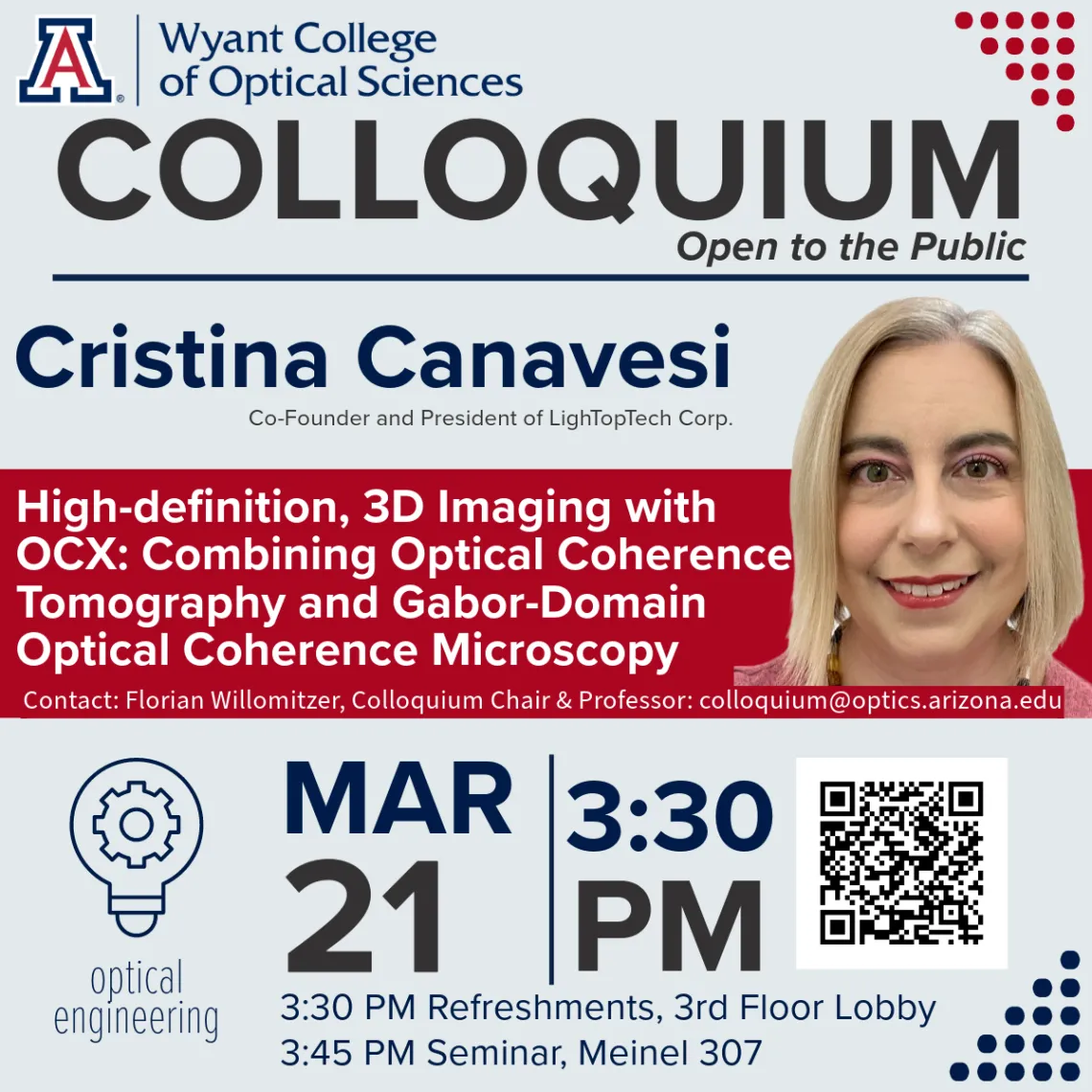OSC Colloquium: Cristina Canavesi, "High-definition, 3D Imaging with OCX: Combining Optical Coherence Tomography and Gabor-Domain Optical Coherence Microscopy"
Optical Engineering

Title
High-definition, 3D Imaging with OCX: Combining Optical Coherence Tomography and Gabor-Domain Optical Coherence Microscopy
Abstract
Optical technologies, with the capability to non-invasively image cellular structures in real-time, have the potential to revolutionize medicine. Optical coherence tomography (OCT) is an optical imaging technique based on low-coherence interferometry yielding an axial resolution on the micrometer-scale. Gabor-domain optical coherence microscopy (GDOCM), a high lateral-resolution version of OCT leveraging dynamic refocusing and precision scanning, achieves isotropic 2 μm resolution in 3D. In the past decade, GDOCM has demonstrated 3D cellular imaging in various clinical applications, including dermatology, oncology and ophthalmology, as well as nondestructive inspection in industrial applications.
OCX is a novel dual-modality imaging system that combines optical coherence tomography (OCT) and Gabor-Domain Optical Coherence Microscopy (GDOCM) to simultaneously visualize tissue morphology in three dimensions and resolve cellular features over a 10 x 10 mm2 region. The OCT modality is first used to survey the sample and identify the region of interest, followed by high-definition imaging with GDOCM. OCX enables optical biopsy capabilities in a compact format.
The structural OCX imaging capability has been enhanced by adding functional modalities and by incorporating machine learning techniques. In particular, convolutional neural networks were applied to automatically segment the endothelial cells in human cornea for quantitative, unbiased assessment of corneal health. A novel algorithm for optical coherence tomography angiography (OCTA), an attractive diagnostic tool for non-invasive, label-free vascular imaging in vivo, was demonstrated in conjunction with OCX to extract high-resolution cutaneous vasculature, significantly improving the visualization and characterization of micro-capillaries in vivo.
Bio
Cristina Canavesi is the Co-Founder and President of LighTopTech Corp., an optical technology company based in Rochester, NY that is building innovative optical instruments for noninvasive imaging in medical and industrial fields. She holds a Ph.D. in Optics from The Institute of Optics, and an MBA from Simon School of Business, University of Rochester. Dr. Canavesi was a Fulbright fellow. She was awarded the SPIE Optical Design and Engineering Scholarship (2012) and was the 2015 recipient of the Hugh H. Whitney Award at the Simon School of Business, University of Rochester. Dr. Canavesi is the Secretary of WiSTEE (Women in Science, Technology, Engineering and Entrepreneurship) Connect and is a member of Beta Gamma Sigma. Dr. Canavesi was a 2019 Millennials in Manufacturing Awardee and was selected for Inspiring Fifty Italy in 2021. Her research interests include biomedical imaging for optical biopsy and image processing for unbiased assessment of tissue properties.
Contact
Florian Willomitzer, Colloquium Chair & Professor: colloquium@optics.arizona.edu



